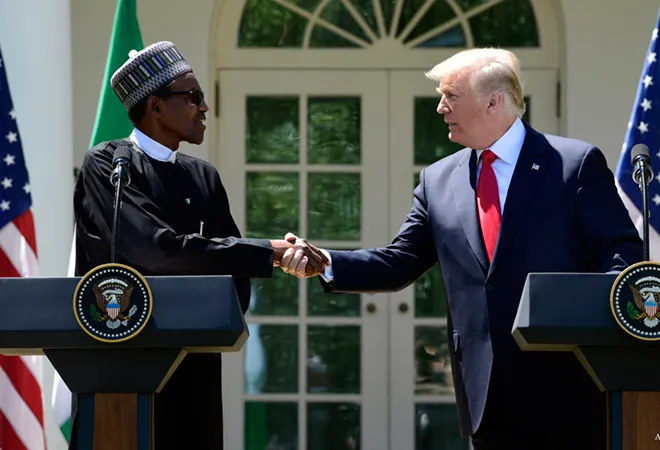
How Donald Trump has changed the world series>
When US President Donald Trump took office in 2017, his administration seemed poised to make major changes to the country’s policy in Africa. The longstanding US goals of advancing democracy and governance, peace and security, trade and investment, and development in the continent remain valid. However, the pursuit of these objectives has increasingly lost focus, becoming fixated with inputs rather than outcomes. As Africa becomes more populous, young, mobile, networked, and educated, these transformations, as well as emerging political, economic, and security trends, are increasing Africa’s significance to US national interests. Whether Trump wins a second term in the forthcoming election, or Joe Biden scores a victory, America’s Africa policy needs a reset.
In his Africa engagement, President Trump has mostly opted for continuity. His administration has continued to engage with Africa through major US policy initiatives such as the Millennium Challenge Corporation (MCC), the US-Africa Leaders’ Summit, the US International Development Finance Corporation (DFC), and the African Growth and Opportunity Act (AGOA). Trump has left the AGOA intact, under which sub-Saharan African products enter the United States free of duty, despite abandoning two other “unfair” trade agreements such as the Trans-Pacific Partnership and the North American Free Trade Agreement. Trump has also launched his own signature trade and investment initiative, Prosper Africa, which aims to facilitate private US investment. Although Trump has personally not been invested in Africa, his administration has remained diplomatically engaged with the continent. His appointments for Africa, most notably Tibor Nagy, assistant secretary of state for African affairs from July 2018 and Mark Green, who served as USAID administrator till April 2020, have largely been free of controversy.
Despite these developments, the US’ current policy framework requires serious scrutiny to validate what works and discard what is no longer effective. President Trump has yet to build rapport with most African leaders; indeed, no other US president since John F. Kennedy has met with fewer African leaders while sitting in the Oval office. Compounding the scenario are certain derogatory remarks from senior US officials, travel bans, and proposed budget cuts which have been deplored by African leaders and publics as neglectful and insensitive. Moreover, President Trump’s decision to withdraw from the Paris agreement on climate change, and his intention to withdraw from and defund the World Health Organization—equally bode ill for a continent with fragile public health infrastructure. Furthermore, recent proposals from the US Department of Homeland Security to revamp student visa rules, if implemented, will disproportionately affect students from 36 African countries and dissuade them from choosing education in the US. This will not only cost the US economy but will benefit global competitors like China. After all, China, along with the US, attract the most number of African students. If the US implements the new visa rule, China will become the alternative destination for African students.
Terrorism and violent crimes across Africa continue to pose significant threats to US national security interests; they put American lives at risk and drain vital resources. Currently, the US has some 7,000 military personnel on rotational deployment across the African continent. The United States Africa Command (AFRICOM) consists of a constellation of more than two dozen outposts, and reportedly has 29 bases in 15 African countries, mostly concentrated in Sahelian states and Horn of Africa. However, President Trump’s administration is considering cutting several hundred troops in West Africa and leaving a base in Niger to redirect resources towards China and Russia. Such a move will be counterproductive and will likely result in a surge in violent extremist attacks on the continent and would be misunderstood by Africans. Despite US pessimism over increasing Chinese military engagement in Africa, the move to abruptly pull American forces out of the continent is potentially short-sighted, pushing African countries closer to Beijing. Instead of simply aiming to counter China’s engagement, African countries would rather have the US compete in areas of capacity building, trade, and investment—areas that will undoubtedly bring in greater benefits to their development goals.
The views expressed above belong to the author(s). ORF research and analyses now available on Telegram! Click here to access our curated content — blogs, longforms and interviews.




 PREV
PREV


